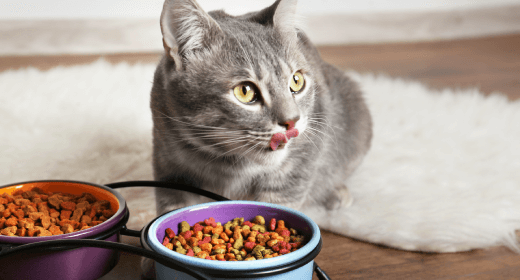

Good nutrition is key to a long and healthy life for all living beings. That being said, cats need a balanced diet to be able to grow, maintain their body, stay active, and fight any illnesses or recover from them. As a pet parent, you must be aware of the right ingredients to include in your cat’s diet.
Cats are carnivores and they need nutrients that are found only in animal products. Cats were originally hunters and would feed on their prey to derive high amounts of protein, moderate amounts of fats, and some carbohydrates to maintain a nutritional diet. Today, most cats that are domesticated do not need to hunt but still require their food to contain the right proportions of nutrients to be able to live a healthy life. Apart from that, cats also need nutrients such as minerals, vitamins, fatty acids, and amino acids.
The best diet for cats will contain all the essential nutrients in the right proportions. A variety of ingredients can help you provide the right energy sources for your cat. For example, a nutrient like calcium can be derived from ingredients like dairy products, organ tissues, bones, bone meals, meat, legume plants, and through mineral supplements. Devising a cat diet plan is all about making sure your kitty gets the right amount of proteins, fats, carbohydrates, vitamins, minerals, and water. Keep reading to learn more about how different nutrients play a part in your cat’s well-being.
As carnivores, cats need to eat a lot more protein as compared to many other animals. Protein is also the primary source of energy in cats as it helps them maintain skin, hair, muscle, fur, tendons, ligaments, cartilage, enzymes, antibodies, hormones, and more. Cats use protein for energy and for maintaining their blood glucose levels. Its liver enzymes are continuously breaking down proteins to do so. If cats do not consume enough protein, their bodies will start breaking down their own muscles to fulfil their energy requirements.
The two main sources of protein used in cat food are plant protein and animal protein. If you are a vegetarian and a vegetarian diet appeals to you for your cat, keep in mind that this may not be the best decision for your feline’s well-being because it will not be able to meet its nutritional requirements through plant protein sources alone. Certain nutrients are only present in animal protein such as taurine, methionine, and cystine.
Animal protein in cat food is derived from chicken, turkey, lamb, beef, and fish. Different meat meals and meat by-products are also available in the market today. While many pet parents may think that these meals are not a good option, they actually act as a great source of concentrated protein.
The right amount of protein for cats depends on their age. Adult cats need a high percentage of protein as compared to dogs, humans, or many other animals. While the exact proportions may vary, adult cats need around 26% protein in their meals. Protein requirements for kittens may change according to their medical history and age. It is best to consult a veterinarian to make sure your kitten receives the right nutrition.
Vitamins are essential for your cat’s metabolic function and therefore must be included in small amounts in its diet. Many enzymes that help maintain normal feline metabolism cannot function without vitamins.
Several cat food ingredients such as fruits, vegetables, animal tissues, vegetable oils, grains, and seeds contain vitamins. It is very difficult to nail down the right amount of vitamins that your cat needs through just different foods. For this reason, vitamin supplements should be included in your cat’s diet.
If your cat is healthy and is eating a balanced and nutritious meal, additional vitamin supplements may not be necessary. In some cases, vitamin supplements can also be dangerous if your cat is already healthy and does not require them. It is best to consult a veterinarian and be sure of your cat’s health and its requirements.
Your cat’s body needs inorganic compounds, also known as minerals, to function properly. Many minerals that your cat needs are derived from animals and plant-based ingredients. However, for your cat’s food to be completely balanced, food manufacturers always add mineral protein to their food formulas.
There are a lot of minerals that should be present in your cat’s diet such as calcium, phosphorus, potassium, magnesium, iron, sodium, chloride, copper, zinc, manganese, iodine, and selenium. These minerals help cats maintain nerve, muscle, and heart function. They also aid in enzyme function, supplying oxygen throughout the body, skeletal growth, and much more. Your cat’s food formula will always contain some minerals. If you want to be sure about your kitten getting the right nutrition, take it to the vet and let them decide the perfect cat diet plan for your furry friend.
Crude fat is estimated by extracting fats that are present using ether and the crude fat level of every cat food formula will be listed in the guaranteed analysis section on the packaging label.
Including fats in your cat's diet is extremely important. While proteins are an important energy source for cats, fat is the most energy-rich nutrient in your cat's diet. They act as transport molecules that help carry out nerve impulses. Essential fat sources such as omega-3 fatty acids and omega-6 fatty acids help maintain your cat's skin, coat, and fur health.
Fats and other essential fatty acids are found in food formulas that contain liver, chicken, beef, turkey, and fish. At times, manufacturers add extra fat to their formula. You can ascertain the same by checking the fat sources on the ingredient list label. Fish oil, beef fat, and soybean oil are examples of added fat.
Keeping cat food weight management is extremely important when it comes to fats. Cats need to maintain a certain body type to stay active. Hence, a diet with high levels of fats is not recommended. Your feline friend should not be consuming more fat than it requires on a daily basis. Doing so will lead to your cat putting on weight and inviting health troubles. Talk to your veterinarian to know the ideal fat content for your cat’s diet.
Many animals need carbohydrates to obtain energy. However, since cats derive most of their energy from proteins and fats, carbohydrates are not that important in their diet. No, this does not mean that you can completely stop including carbs in your cat’s diet. Small amounts of carbohydrates are ideal for your cat to derive some energy. A diet that contains high levels of carbs is not recommended for cats at all since it may aid in putting on weight and will attract serious diseases such as diabetes.
Your cat’s diet should not include more than 10% of carbohydrates. Dry diets may have high amounts of carbohydrates. The only way to ensure that your cat is not eating too much carbs is by including wet food in its diet.
The best diet for cats includes the right balance of all nutrients. A perfect balance of proteins, fats, carbohydrates, vitamins, minerals, and water will help your cat to grow healthy and maintain its ideal body weight. If you are concerned about your cat’s diet and need more insights on what to feed your cat in what proportions, simply reach out to your local veterinarian.
You can add protein to your cat’s diet by investing in a high-protein cat food formula that derives its protein percentage from animal-based protein sources.
Every cat is different and has different needs. Their food intake also depends on their age and medical history. Take your feline buddy to the vet to find out how much should you be feeding your cat daily.
Both wet and dry foods are great for cats. Wet food is easy to digest and dry food is easy to eat. Choose a type that you think has the best nutrition for your cat. You can also include both types in your cat’s diet. s
Yes, cats can survive on just dry food. Ensure that the dry cat food you are using has a good amount of nutrients present and you’re good to go.
A proper cat diet consists the right amount of all nutrients– fats, proteins, carbohydrates, minerals, vitamins, and water.


Good nutrition is as important to your cat as it is to you, but her nutritional needs are quite different! Unlike humans, a cat needs a high-fat diet with less fibre. Even if you prefer a vegetarian diet, you should understand that cats are carnivores. They need nutrients from animal protein and fat for optimal health, and they benefit from fibre for a healthy digestive tract and carbohydrates for energy.
With thousands of pet foods available, how do you pick the one that's right for your cat?
Start by identifying the cat's life stage and lifestyle. Kittens, nursing mothers, and mature/senior pets are examples of life stages, and each has different nutritional requirements. All cat foods should state which life stage they are recommended for.
Nutritional needs also vary depending on lifestyle. A cat whose primary activity is guarding the couch doesn't need as much energy as one who likes to spend time roaming outside.
Finally, it is important to take into account any special medical condition your cat may have, including food allergies that might require a special diet recommended by your veterinarian.
Once you've determined your cat's life stage and lifestyle needs, decide whether to feed dry or wet food. Most cats thrive on only dry food. This type of food promotes oral hygiene and health through abrasive action. Some cats, especially finicky eaters, enjoy the smooth and wet texture of canned or pouch foods.
Remember that, while dry food can be left in a bowl all day, wet food should be thrown away after 30 minutes if not eaten. Dry food is the best choice for busy people who are not normally home during the day.
Once you know your pet's nutritional needs and your pet's preference, you are ready to go shopping.
Because cats need the nutrients found in animal sources, it’s best to pick a food in which a primary ingredient (one of the first ones listed) is an animal-based protein source such as chicken, lamb, fish, egg, or one of their by-products. These ingredients contain all the essential amino acids, including taurine, which isn’t found in a vegetable-based protein source.
Using a combination of carbohydrates in a diet, such as corn meal or barley and grain sorghum, ensures efficient absorption and helps maintain energy levels. And beet pulp is an excellent fibre source that promotes a healthy digestive tract.
For a soft, thick coat and healthy skin, your pet needs fatty acids like those found in vitamin-rich fish oils and quality fat sources such as chicken.
Cat food labels provide limited information on the nutritional value of your pet's food because labeling regulations do not allow manufacturers to describe the quality of ingredients on the package. A reputable pet food manufacturer can explain to you how they evaluate and assure the quality of their products.
When choosing food, the price on the bag, while important, is usually not the best consideration. A low price may indicate cheap ingredients, or ingredients that change as manufacturer costs fluctuate.
In addition, many lower-priced products have higher daily portions to provide the same amount of nutrition found in a high-quality diet. To get a better idea of cost, it is the cost per feeding, not the total cost, that counts.
To figure cost per feeding, divide the total cost by the number of days the product lasts. For example, a 20-lb bag of food that costs $18.99 and lasts 30 days is $0.63 per day. A 20-lb bag that costs $15.99 and lasts 20 days costs $0.80 per day. When compared closely, high-quality pet foods are quite favourable to other brands.